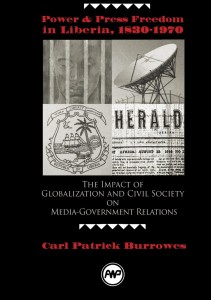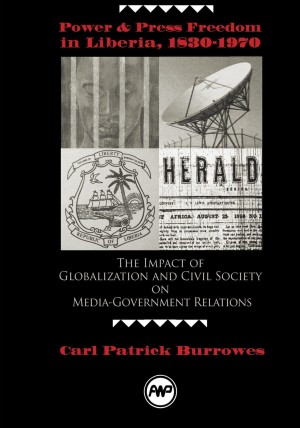[row][col type=”6″]
[raw][richtestimonials id='7'][/raw]
Table of Contents
Chapter 1: Introduction
Liberian society and the press
Theoretical framework
Chapter 2: Colonial Period, 1822 to 1846
Liberia in 1843
A press to herald a nation or illuminate all Africa?
Institutional context of the press
Denominational affiliation and politics
Government-church controversies
“Seys Party” and the 1840 election
Chapter 3: The Republican Era, 1847 to 1899
The press : raising national consciousness
Race, republicanism and freedom of expression
Geographic limits of society
Churches, government, and the press
Electoral politics and journalism
The 1871 coup d’État
Competing ideas of status
Johnson’s attempted synthesis
Chapter 4: The Creation of Greater Liberia, 1900-1930
From a culturally-based polity to a territorial state
Government, politics, and the press
Influence of fraternities, corporations, and chiefs
Declining influence of the church
From Pan-Africanism to Liberian nationalism
Political emergence of women
Church affiliations and political alliances
Politics and restrictions of free expression
Fall of the King administration
Impact of the expansionist paradigm
Chapter 5: The Drive for Modernization, 1931 to 1970
Journalism during the Barclay years
Electoral politics
Barclay uses the sedition law
Tubman further restricts rights
Institutional and cultural changes
Journalism in the Tubman years
Restrictions on the press
The Independent, the Listener and the 1955 elections
Themes and legacy of the period
Chapter 6
Modernization and Press Freedom
Liberia and press freedom theory
Press freedom and stability
Press freedom and globalization
Press freedom and power relations
Core values and restrictions
Policy and research implications [/col]
[col type=”6″]

[dropcap1]P[/dropcap1]ower and Press Freedom in Liberia, 1830-1970 tells the rich and sometimes heroic story of the press in Liberia, from 1830, when the first newspaper was established, to 1970, the nadir of government control of the media.
Early newspapers were infused with a broad race consciousness, reflected in names like Africas Luminary, the African Watchman, and New Africa, which gave way to a specific nationalism at the turn of the last century, as the curtain of European colonization separated Liberians from the rest of the continent.
Initially, newspapers featured biting social commentary and enjoyed wide latitude to criticize officials. But, increased foreign investments in the 1940s brought stringent restrictions and a rise in government ownership of the media.
This book is a pioneering work in Liberian media history
In a very real sense it is a history of Liberia itself. Burrowes takes us back to the founding of the country’s first ever newspaper, The Liberia Herald in 1830, 17 years before Independence, and then leads us through the historical development of the media and of the nation state itself, through 1970.
In the process, he has given us a rich and vibrant introspection into the history of our country and its press as no other Liberian author has done. He records the repression and persecution which journalists experienced beginning in the 1940s and continuing, with even tragic results in later years. Burrowes has given us an invaluable and in depth lesson in Liberian history and media.
[dboxslider id=’1′]
[/col]
[/row]


